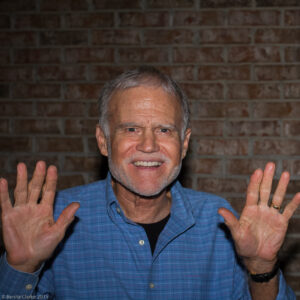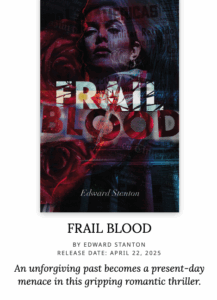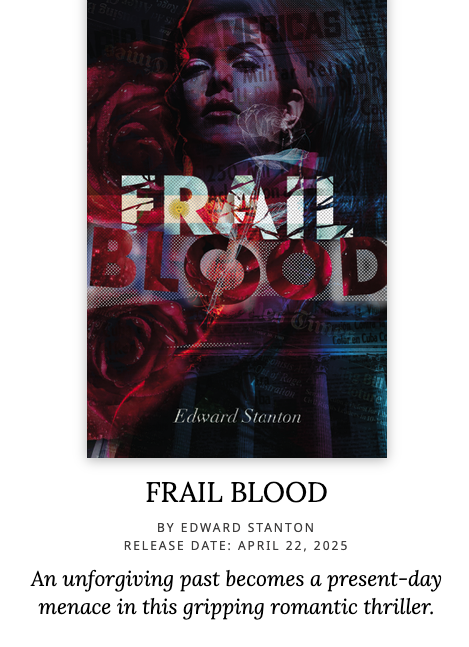Published on the 40th anniversary of the Trail de la Juntas in Argentina, this latest installment in our author interview series features Edward Stanton—writer, scholar, and lifelong lover of language.
In this timely conversation with interviewer Ben C. Davies, Stanton reflects on how literature, history, and personal experience converge in his powerful new novel Frail Blood. He discusses the craft of writing, the enduring scars left by authoritarian regimes, and why publishing this story now—amid the rise of an aspiring autocracy in the U.S.—carries a deeper sense of urgency and meaning.

What inspired you to become an author? Was there a defining moment that set you on this path?
In fifth grade I read Mark Twain’s Tom Sawyer. When I finished the novel, I decided to imitate Tom by playing hooky. My parents grounded me, my teacher punished me, and I realized that books and life are joined like flesh and fingernail.
How would you describe your writing style and approach to storytelling?
I strive to reduce language to its trunk and branches—mostly verbs and nouns—and to use its leaves, fruits and flowers—mostly adjectives and adverbs—as sparingly as possible, for contrast and greater effect. In summary, muscular prose with lyrical flights. The style shapes the storytelling.
Who are some of your biggest literary influences or favorite authors?
Behind and above the Yanks like Dickinson, Whitman, Twain and Hemingway, there’s always Shakespeare, to whom I return constantly, the wellspring of our language. Since I’ve studied and taught Spanish and Latin American literatures, two of the world’s richest, I would also mention Cervantes, St. Teresa, Quevedo, Lorca, Neruda, Borges, Cortázar, Rulfo, Lispector, Luiselli.
What’s your typical writing routine like? Do you have any rituals or habits that help you stay focused?
Woody Allen’s advice works for writers too: Just show up. In my case that’s every weekday morning. Sometimes before going to bed I re-read what I’ve written that day in order to get a nighttime view of the text. Also to set it working in the subconscious during sleep.

FRAIL BLOOD
What is the title of your upcoming book, and how would you describe it in a few sentences?
Frail Blood tells the story of a love strong enough to shatter crystal, a secret so perverse that it destroys a family, crimes so far-ranging that they convulse a nation. The novel is set in the aftermath of Argentina’s bloody civil war, sometimes incorrectly known as the “Dirty War.” The official term in Argentina is the “campaign of state terrorism,” which doesn’t exactly role off the tongue.
What inspired you to write the book? Was there a particular event, idea, or personal experience that sparked it?
I was fortunate to have a Fulbright fellowship for both Argentina and Uruguay, two countries ravaged by military regimes in the 1970s and 80s. I was surprised that many people were reluctant to speak about the period—both collaborators with the juntas and those who opposed them, often with great personal loss. At the same time, I fell in love with a porteña, a woman from Buenos Aires, who introduced me to Argentines from all walks of life, whom I never would have met as a mere foreigner and traveler. After repeated trips to the country, I’d learned enough to attempt a novel that explores the ways in which an authoritarian regime can distort a people’s history and mentality for decades after its demise.
Video by Studio Luce Books
What themes or messages do you hope readers take away from your book?
The depths of human cruelty and the possibility for redemption in the worst of times. The intricate relations between love and power in all their dimensions.
How does this book compare to your previous works?
Frail Blood resembles some of my other books because of its setting in Spanish America, a part of the world that I’ve explored, researched and written about for years. Also in its style, which I described above. Frail Blood differs from my other books in that it defies gender categories, having been described as “upmarket fiction,” “historical fiction,” a “literary novel,” an “erotic thriller” and a “political thriller.” All five terms are justifiable.
Did you encounter any challenges while writing this book? Is so, how did you overcome them?
Every writer knows there are always challenges; it’s so easy not to write! I overcame them in the usual way, just by showing up over a long stretch of time. The gestation period resembled the African elephant’s at 22 months, multiplied by three.
What does this book mean to you personally?
At the most intimate level, it meant transmuting a failed love into a novel. Ars longa, amor brevis. It also gives me a small sense of satisfaction that this novel, which portrays the lasting harm wrought by despotic regimes, will be published during the rise of an aspiring autocracy in the U.S.
If readers could remember just one thing after finishing your book, what would you want it to be?
“Frail Blood was a good read. It also made me think about what might happen in my own country.”
How do you hope this book will impact or resonate with readers?
A book’s impact is always a great unknown. Not even the best writers, publishers, editors, agents or critics can predict it accurately. However, at a time when “the forces of reaction, violence and oppression” (Fernando Operé) are menacing the U.S. and other countries, I hope readers sense that however remote the Argentine dictatorship may seem, with its some 30,000 victims killed or disappeared, that yes: “it could happen here.”
What’s next for you? Are you already working on another project?
When Spaniards order drinks at bars, which happens frequently, they never order “the last,” because it would be bad luck. They always order “the next-to-last” (el penúltimo). In the same way I never speak about my “last book.” There will be another.

